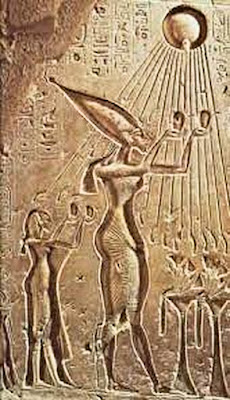The Sun In Egypt
Dear Reader,
I was drawn to watch a film on TV the other day, but unfortunately missed the main part of it and ended up by watching only its last thirty minutes. But the last part of the film was, for me, riveting. It contained a speech by the main character of the film which fully espouses the main characteristics of what monotheistic religion is all about, and the time period in which it was spoken was the 18th dynasty of ancient Egypt.
The film - The Egyptian - is, thankfully, to be found in its entirety on Youtube. See the full film on Youtube.
When we think back to the grand epic films of 60 years ago we might automatically think of Ben Hur, Lawrence of Arabia and The Ten Commandments, but those blockbusters came after The Egyptian (made 1954) and the great drama of those films effectively drowned out the story of The Egyptian which might seem naive by comparison, as a production. But The Egyptian, throughout, narrates a story about man himself, and about the challenges he might face in life on the road to the redemption of his soul, as is revealed in the final speech to which I alluded before.
Based on Finnish writer Mika Waltari's 1945 historical novel of the same name, The Egyptian is a 1954 epic drama film made by 20th Century Fox. An English-rich cast contained Edmund Purdom, Jean Simmons, Peter Ustinov, and Michael Wilding (as Pharaoh Akhenaten) with other leading roles played by Victor Mature, Gene Tierney and Bella Darvi.
Pharaoh Akhenaten dramatically introduced a single religion, said to be based on the worship of the sun disk “Aten” but in fact was based on the principle of there being one creator of the universe from which all life stems. His monotheistic view was to herald the teachings of Judaism, Christianity and Islam, but, notably, the monotheism is in accord with the essential philosophy of India, which considerably pre-dates Akhenaten.
This strong monotheistic theme, therefore, would indicate a Perennial Philosophy that Aldous Huxley wrote about and has been emphasised yet again (and more dramatically) by the teachings of Sri Sathya Sai Baba, in India. A common theme in history also is how the priesthood has, time and again, been the 'problem' for religion in their desire to formulate a prophet's teaching to a standard (and often degraded) code.
Akhenaten built a new capital city, Amarna, using entirely new architectural techniques, and its temple walls have inscribed on them texts that would later find their way into the Old Testament of the Bible.
The priesthood was firmly against Akhenaten's theology, which lasted only 17 years, and maneuvered the people back to the old religion where the Pharoah himself was to be worshipped. Enter, then, King Tut, whose full name revealed the god Amun instead of Aten, which was part of his birth name as a son of Akhenaten.
The topic of Akhenaten re-awoke in me a time, nearly 50 years ago, early in my investigation into esoteric teachings, when I met a person (one of many interesting people I met in those days) who had studied the teaching of Akhenaten and relayed to me some of its principles. They still resonate with me today.
I should add that the Finnish writer Mika Waltari, who wrote The Egyptian, appears to have a cult following. His books still sell, and for large amounts of money. Clearly, people see great value in him as an author, who, just following the terror of World War Two, was greatly inspired to write not only this book but other seminal books, including one on Jesus, with the intention, no doubt, to inspire.
In these days of pandemics and Climate Change, I urge everyone to read deeply into the essential teachings of monotheism and its practise. I argue that without that mankind faces an unnecessary struggle: man has largely forgotten his birthright and looks to solve his problems by his own devices, forgetting his origins and creating more problems in the process.
Selflessness and love is what Akhenaten proclaimed, and repeated by many other great souls.
Thank you for reading this.

Comments
Post a Comment